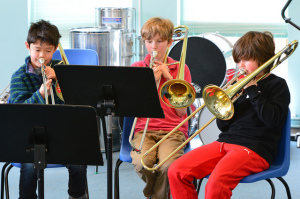For most piano students, there are no physical limitations to deal with when learning to play. Other than not being tall enough to reach the pedals (totally fine to play without the pedal for awhile), it’s probably on the easier side to play. By physical limitations I mean something about the way you need to hold, blow into, or play the instrument or about your physical size that makes it really hard for the instrument to work properly or sound decent.
When I started piano lessons as a kid, I was playing songs in my first lesson that sounded really good! When I tried the clarinet soon after that, things weren’t so easy. The clarinet was really heavy and awkward to hold. My right arm would hurt from holding up the weight of the clarinet under the thumb rest. Squeaks happened constantly and my sound was not pretty.
When I switched to oboe, my difficulties got even worse. Blowing into the tiny opening in the double reed made me light headed and dizzy not to mention that I sounded like a sick duck (putting it nicely). I’m very grateful that I kept with it! There’s no way I would have developed the beautiful, singing sound that I have today had I not kept going despite these frustrations.
Unfortunately these frustrations are very common. Many students glamorize the idea of playing an instrument without realizing just how physically difficult it is. Once they’ve begun learning, many want to quit or do decide to quit because of these challenges. If you’re currently learning or thinking about learning an instrument other than the piano, chances are you will experience some of this. So, what should you do if physical limitations got you down?
Here are my ideas:
#1: Start later
If at all possible it really is best to begin learning some of these instruments once you’re a little bit older and have grown more. Having longer arms, longer fingers and bigger hands really helps tremendously! If you play clarinet, then your hands will be able to fully cover the keys and your notes will sound. If you play trombone, your arms will be long enough to reach all 7 positions. While it’s not impossible to learn one of these instruments while younger, it definitely will make things harder. This is why most schools don’t have their students start in band or orchestra until the kids are in at least 4th or 5th grade. The size difference between a 4th grader and a 2nd grader is huge and can make a major difference in how the experience goes learning a new instrument.
#2: Get a modified instrument or learn another instrument first
This is not always possible, but if you can, get a smaller version of the instrument you want to learn. For example, use a cornet instead of the trumpet; play a ½ size violin; rent a flute with a curved headjoint; learn the euphonium not the tuba.
There is also no harm in learning another instrument for a few years and then switching to your dream instrument later on. Usually having prior musical background will only help you in the long run.
#3: Take breaks
It is extremely important to take many breaks. More frequent smaller practice sessions are better than trying to fit in only a few long ones. When your fingers ache from pressing the guitar strings down, go take a break. When your arms are sore from holding your viola and bow, go do something else for awhile. When your mouth hurts from forming the flute embouchure, stop and come back to it later. As you build up more muscles in all these areas that you don’t use for other things, you’ll start being able to play for longer periods of time and won’t need as many breaks.
#4: Be patient
This is the most important tip of all! You must remain patient with yourself. Often students who have played piano and switch to another instrument find it very frustrating. On the piano you sit down at the bench and pretty much immediately are playing songs. With other instruments, the instrument does not sound pretty for quite some time. You may get squeaks or screeches or some notes might not even come out at all. Developing your tone quality and overall sound is just as important as learning the fingering of new notes.
If it seems like your instrument is not cooperating with you, stay patient with yourself. Everyone goes through this. Your teacher will give you tips on what you can do to help. Listen to him and keep at it. If you keep going and don’t allow yourself to feel so frustrated that you give up, I guarantee there will be light at the end of the tunnel. One day you’ll play and it won’t be such a struggle. Notes that used to not come out for you will come out with ease. Your tone will start to sound nice and sonorous. I’ve seen this time and time again with my students who don’t give up.
Now I want to hear from you! Did you have struggles when you were learning your instrument at first? What did you do to help overcome them? Teachers, how do you help your students when physical limitations get in the way? Leave a comment below with your thoughts.
Thanks so much for reading! Please “like us” on Facebook and subscribe to the newsletter day. Have an upbeat day!
Sincerely,
Cassie

{ 0 comments… add one now }